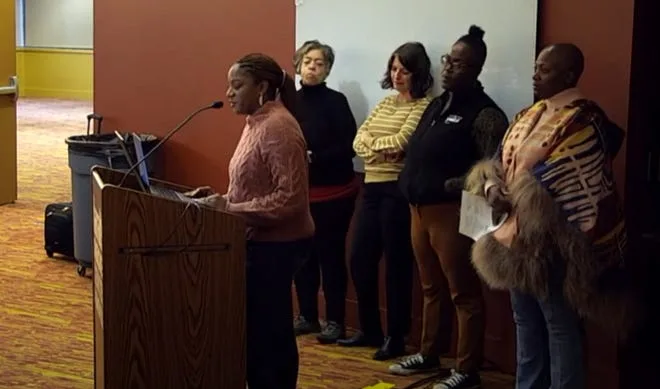
ASHEVILLE – Another project manager of Asheville’s historic reparations process has stepped down, the second in two years. The city did not immediately appoint a new manager after the Oct. 16 announcement, but staff facilitators indicated they were staying on board despite the shift.
This comes nearly a year after consulting firm TEQuity, the project’s first manager, resigned in November 2022. TEQuity was awarded a $365,583 contract in September 2021. That contract and management of the reparations project was reassigned to Christine Edwards and her firm, Charlotte-based Civility Localized, in November.
At the Oct. 16 meeting of the Community Reparations Commission, Edwards announced she was stepping down from her role.
“While it has been an incredible honor to be a member of this effort, it’s become evident that through these several months that my involvement is not having the intended impact on the forward movement of this very important work,” Edwards said. “Therefore, I am going to be taking a step back from this position of project manager.”
She stood before the commission at a podium, having vacated her seat beside the commission’s chair and vice chair. After her statement, she did not return to the table.

It’s not the only shakeup among reparations leadership. The city’s equity and inclusion director, Brenda Mills, charged with overseeing the process, announced her retirement in September, effective Jan. 31. Since the commission was first seated in April 2022, after experiencing months of delays, it also saw the departure of Rachel Edens, Buncombe County’s first chief equity and human rights officer, who left the job after little less than a year.
Edwards said she would stay on as the administrative support manager, whose duties include handling the payment of stipends of commission members and facilitators, but would no longer lead the strategic direction, agenda setting or act as the liaison between the commission and the local municipalities.
Chair Dwight Mullen called the news “sudden,” and said he had only gotten word of it that morning.

The announcement was initially scheduled for later in the evening’s agenda, according to staff, but at the top of the meeting, commission member Keith Young, the former City Council member who wrote the city’s historic initiative, called for the address to happen at the beginning.
“There is some information that has come to light in reference to Ms. Edwards that I believe we need to discuss at the top of the agenda because I believe it puts into flux everything this commission is doing,” Young said in the first minutes of the meeting.
Following Edwards’ statement, four facilitators of the commission’s impact focus areas, positions that were initially filled by TEQuity, said they would be remaining as part of the process, ensuring that recommendations would not pause and efforts would continue.

What will happen to the contract?
Despite these assurances, confusion was apparent among many members of the commission. In response to questions about Edwards’ replacement and how this would effect the process, Mills told commissioners that she couldn’t “speak in detail” as things are still being worked out, “but we have a high level plan.”
There is an intention to add staff on the city side, Mills said, and Vernisha Crawford, CEO of the Charlotte-based Trauma Informed Institute, who facilitated the commission’s July retreat and some of the September meeting, would be staying on to facilitate meetings moving forward.
“We’re not going to leave you hanging,” Mills said.
The initial terms of TEQuity’s contract, inherited by Edwards, was through April 2023. It is unclear if or when that timeline was extended, and what remains of the contract.
In response to Citizen Times questions about the contract, Mills said it would be “amended to note the role of administrator.”
“She did not fully step down; while she left the project manager role, she and her firm will continue serving in an administrative capacity,” Mills said of Edwards. “We will meet with the city to build the project management plan forward.”
Contract details, available through the city of Asheville’s open data portal, indicate TEQuity’s contract was closed out in the amount of $172,717 in December 2022. Of the remaining balance, $192,882 was assigned to Edwards through Amplify Consulting, now Civility Localized.
More:TEQuity backs out of Asheville reparations project management, Charlotte firm takes over
Timeline extension?
Also at its Oct. 16 meeting, the commission voted to extend the reparations timeline until December 2024.
This came after a resolution was introduced by Young in September to extend the timeline for two years. An amendment to that motion came Oct. 16, shortening it to eight months. Typically, recommendations from the commission go to Buncombe County Commission and Asheville City Council for final approval.
“This thing moving forward, these changes that keep happening, we are being asked to do something on a timeline that again, is arbitrary,” Young said earlier in the meeting. “This affects that work.”
Regarding the vote, Mills said city and county staff will meet next week to discuss “next steps.”
“The original reparations resolutions approved by the Council and County Commission, in addition to establishing the commission, provided an initial timeline for its work,” Mills said. “An extension of this period would likely require additional Council and County Commission action.”
The 10-4 vote was not a unanimous decision. Among the opposition was Bobbette Mays, who said within their impact focus areas, they are doing the necessary work. What is needed, she said, is for everyone to show up, and for time to be well managed.
“I don’t want to start over or do more time,” Mays said. “That means you’ve got to start all over again. You’ll be sitting right here a year-and-a-half from now, with some new people talking about the same thing.”
More:What has been achieved with Asheville reparations? Summit encourages participation
More:Asheville residents allege ADA noncompliance of downtown parking deck; How bad is it?
Sarah Honosky is the city government reporter for the Asheville Citizen Times, part of the USA TODAY Network. News Tips? Email shonosky@citizentimes.com or message on Twitter at @slhonosky. Please support local, daily journalism with a subscription to the Citizen Times.


